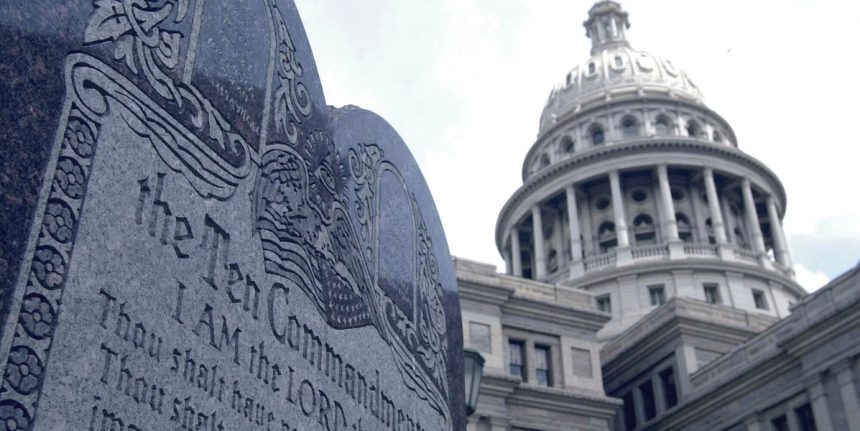There’s a thin line between exposing children to ideas and forcing beliefs on them.
At least, that’s what a federal judge in Texas concluded after he ruled Wednesday that public schools in the state are not allowed to display the Ten Commandments in classrooms.
U.S. District Judge Fed Biery, an appointee of former President Bill Clinton, issued a preliminary injunction to temporarily halt enforcement of SB 10, a Texas law that requires public schools to post a Protestant version of the Ten Commandments in classrooms. The law was set to take effect Sept. 1.
Related: White House Spokesperson Totally Loses It Over Rock Star’s Trump Takedown
“[T]he displays are likely to pressure the child-Plaintiffs into religious observance, meditation on, veneration, and adoption of the State’s favored religious scripture, and into suppressing expression of their own religious or nonreligious background and beliefs while at school,” Biery wrote.
Related: Rock Star Gives Brutal, Unexpected Take On Trump-Zelenskyy Meeting
In June, a group of Texas families from diverse denominational backgrounds — some plaintiffs are Jewish, while others are Christian, Hindu, Unitarian Universalist or consider themselves “nonreligious” — sued to stop the law from going into effect, arguing that it was not only a violation of the First Amendment but that the displays would infringe on parents’ rights to raise their children as they saw fit.
One pastor plaintiff, Griff Martin, said displaying the Ten Commandments was “un-American and un-Baptist” since it violated the bedrock principle of his family’s Baptist heritage.
“My children’s faith should be shaped by family and our religious community, not a Christian nationalist movement that confuses God with power,” Griffin said.
For now, the ruling will only apply to the dozen independent school districts named in the lawsuit. How the order may be applied to other districts is unclear. The Texas Attorney General’s Office did not immediately return a request for comment Wednesday.
Biery drew on a wide array of subjects — history, literature, politics, art and, of course, religion — to explain his reasoning. His 55-page ruling is dotted with quotes, letters and analogies from a diverse range of figures, from Founding Father Thomas Jefferson to silent film star Greta Garbo, who, Biery noted, famously remarked “I want to be alone” in the 1932 film “Grand Hotel.”
Related: Trump Attacks Smithsonian For Focus On ‘How Bad Slavery Was’ And, Boy, The Responses
“Ultimately, in matters of conscience, faith, beliefs and the soul, most people are Garbo-esque. They just want to be left alone, neither proselytized nor ostracized, including what occurs to their children in government run schools,” Biery wrote.
The judge also laid bare his concerns of what a forced display of one religious group’s sacred texts may mean.
“If government-run public schools also joined hands with religion and had the power to impose religious views, questions arise: Which holy books and prayers would be preferred? The Torah? The Book of Mormon? The Catholic Bible? The New Testament? The Bible as edited by Thomas Jefferson? The Quran? Would Christians be required to face Mecca or observe Hebrew prayer? Would Jews and Muslims be obligated to stand and recite the Lord’s Prayer? One need only look at the states of Israel and Iran to see the conflicts which arise when government and religion become closely intertwined,” he wrote.
Texas argued that posting the commandments in classrooms was not the same as teaching them. But Biery said that argument ignored the fact that students, who are a “captive audience,” may raise questions that their teachers feel compelled to answer.
“That is what they do,” Biery wrote of students. “Teenage boys, being the curious hormonally driven creatures they are, might ask: ‘Mrs. Walker, I know about lying and I love my parents, but how do I do adultery?’ Truly an awkward moment for overworked and underpaid educators, who already have to deal with sex education issues, and a classic example of the law of unintended consequences in legislative edicts.”
Related: Gavin Newsom Is Talking Like Trump — And It’s Infuriating The Right
The judge recommended that if the Texas Legislature felt so compelled to communicate virtue or morality to students in the classroom, they might consider alternatives to posting the Ten Commandments like “multiple versions of lessons of behavior from many cultures melted into the American motto of ‘E pluribus unum,’” Biery wrote, referring to the phrase that translates to “out of many, one.”
“A concept currently in decline,” he wrote.
Texas legislators could similarly consider public displays of the five moral precepts of Buddhism, like abstaining from killing, stealing, engaging in sexual misconduct, lying and intoxicants, Biery proposed.
Or, the judge wrote, maybe just displays of the message “do unto others as you would have them done unto you. Be kind. Be respectful.” Or even a display of the theme found inside Robert Fulghum’s book, “All I Really Need to Know I Learned in Kindergarten” such as, “Share everything. Play Fair. Don’t hit people. … Clean up your own mess. Don’t take things that aren’t yours. Say you’re sorry when you hurt somebody. … Live a balanced life. … When you go out into the world, … hold hands, and stick together.”
The injunction marks the third time that courts have struck down an attempt by school districts to post Ten Commandments in the classroom. A federal appeals court blocked a similar law in Louisiana, and a judge in Arkansas recently ruled that at least four districts are barred from putting up the displays.









